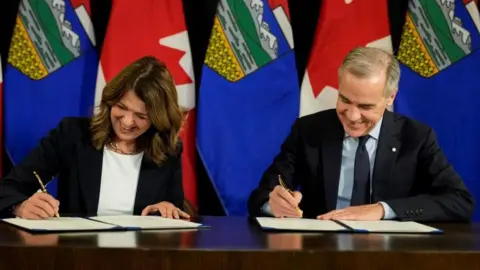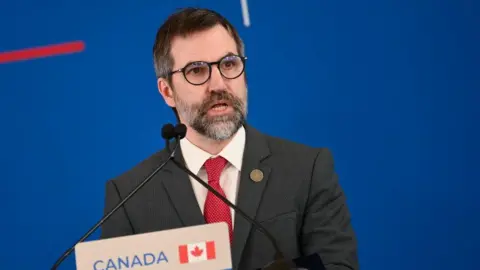Nadine YousifSenior reporter from Canada
 Reuters
ReutersPrime Minister Mark Carney has signed an agreement with the province of Alberta that opens the door to an oil pipeline to the Pacific Ocean, a project long promoted by Canada's oil hub but which faces significant obstacles before it ever becomes a reality.
The deal marks a historic reset between Alberta and Ottawa, but is opposed by British Columbia Premier David Eby, who called the pipeline a “distraction.”
The political challenges facing Carney later became clear following the departure of a prominent minister and longtime environmentalist from his cabinet after the deal was announced.
The energy agreement exempts the proposed Alberta pipeline from some federal climate laws.
In exchange, Alberta must raise carbon prices and develop the world's largest carbon capture program to reduce emissions.
For Alberta, Thursday's deal is the “first step” toward making the proposed pipeline a reality.
Premier Smith said it meant the end of a “dark time” for her province, which she said had long failed to develop its resources.
Carney, meanwhile, said he supports Alberta's project as critical to the country's economic development by helping sell more Canadian oil to Asian markets.
But speaking to reporters on Thursday, Prime Minister Eby expressed disappointment that his province was not included in the discussions that led to the agreement.
“It would be good if BC were at the negotiating table,” he said. “No questions about it.”
He noted that the project does not have a private sponsor or support from indigenous communities, which is a major obstacle to its implementation.
On Thursday evening, federal Culture Minister Stephen Guilbeault announced he had resigned from Carney's cabinet, saying he was adamantly opposed to the energy deal and believed the pipeline proposed by Alberta “would have significant environmental impacts.”
Guilbeault previously served as environment minister and worked for global climate advocacy group Greenpeace before joining politics. In 2001, he made headlines for climbing the CN Tower in Toronto as part of a climate campaign with British activist Chris Holden.
In a statement on Thursday, he said he believed many elements of the climate action plan he implemented as environment minister “have been, or are about to be, dismantled.”
In response, Carney said his government shares Guilbeault's “fundamental commitment to Canada's climate ambitions and climate competitiveness.”
 Getty Images
Getty ImagesThe agreement signed by Carney and Smith exempts the proposed pipeline from a ban on tankers off the coast of British Columbia and commits to suspending federal caps on oil and gas emissions, a significant departure from the policies of Carney's predecessor, former Prime Minister Justin Trudeau.
It also says the pipeline should be co-owned by First Nations and financed by a private company rather than tax dollars.
The agreement adds that both Alberta and Ottawa will “immediately” engage British Columbia in discussions about the project.
The Alberta government is the main proponent of the project, pledging C$14 million ($10 million; £7.5 million) to prepare the proposal, which the province hopes will later be implemented by the private sector.
The plan is in the preliminary stages and a firm route has not yet been determined, although it is expected to extend to the northern coast of British Columbia, allowing greater access to Asia.
The United States is now the largest buyer of Canadian crude oil, accounting for more than 90% of exports, according to Canada's energy regulator for 2023.
Carney said Canada's economic ties with the United States have become vulnerable in light of protectionist tariffs imposed by President Donald Trump and that he aims to double exports outside the United States in the next decade.
In opposing the project, Eby expressed concern that an oil pipeline through British Columbia could jeopardize support from Indigenous communities for his province's liquefied natural gas projects.
“The bottom line for us is that we need to make sure that this project doesn't become an energy vampire with all the variables that have yet to be implemented,” he said.
A group representing British Columbia's coastal First Nations said in a statement Wednesday that an oil pipeline to the province's north coast “will never happen.”
Conservative Leader Pierre Poilievre said the Ottawa-Alberta memorandum only starts a lengthy process that does not guarantee completion of the pipeline.
“This is from a prime minister who promised to act with 'unimaginable speed' during the election,” the opposition leader said.









